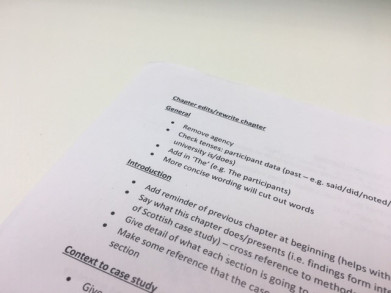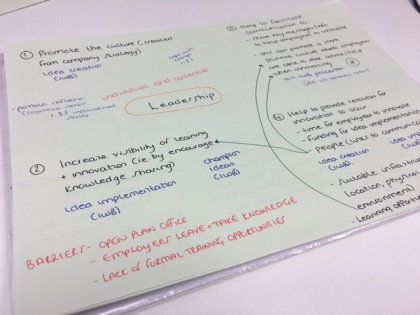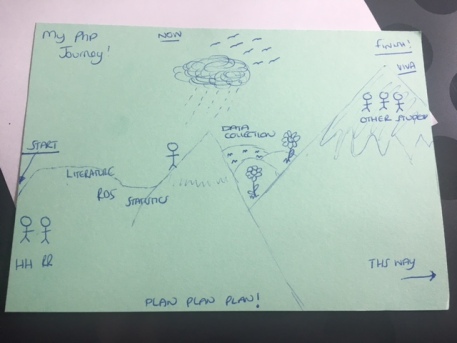Your Research. Your Life. Your Story.
A magnetic community of researchers bound by their stories
Every researcher has a story. What’s yours?
Writing the dreaded findings chapters of my PhD thesis

When I returned from my internship at the Scottish government, my main task was to complete the three findings chapters of my thesis. The purpose of the chapters was to explain the findings of the interviews, focus groups, and the quantitative survey separately for each case study (i.e. one chapter for Scotland, one chapter for Finland, and one chapter for England). I drafted these in a decent time but then left them a little to focus on other elements of my PhD (i.e. my conference presentation, and other things). I finally gave my supervisors a draft of my first case study—the largest of the three, in the hope that I would get some good feedback and then I would be able to edit down and that would be it. Oh how wrong I was!

The feedback from my supervisors was not the best, in terms of both content and the structure of the chapter itself. Whilst writing my chapter I had thought that it did not flow, but I was completely unprepared for what my supervisors said next. All three supervisors agreed that I needed to completely restructure the chapter so that the thematic analysis was at the forefront rather than the research questions directing what I wrote. By guiding the structure with the themes that emerged from participant interviews and focus groups, I would then be able to: (1) highlight the themes that emerged from participant discussions more clearly and (2) be able to discuss the findings in relation to the research questions in the discussion chapter that would follow. The statistics I had completed also did not quite work and I ended up having to re-analyse some of this with some help. The process of re-analysing a part of the survey responses meant that I learned a new statistical technique in the process (one which I have avoided for at least the last seven years!), and I am pleased to say that this was a small outcome of my work.
Initially, I was quite shocked by the comments as I did not think my chapter was that bad. However, after having gone through the process of redrafting the chapter it appears that all of my supervisors were on point with their comments and I finally saw the need to redraft from my supervisors’ perspective (they have done this before—a lot with other students—you know). So, after this supervision meeting, and a quick recap of the edits needed for my chapter (there were 2 A4 pages of comments!), I got down to work on the chapter. At first I struggled as I could not see the relationships between the comments from my participants nor could I see how the emerging themes linked. I therefore took a stand (sitting at my desk of course!) and figured that I could not do this alone. I used the help of my trusty pens (which I bought at the start of my PhD!), pencils, coloured paper, and highlighters to help me plan out (visually) what I hoped to see from my data.

The process of visually representing the relationships on paper started to help my findings finally sink in. I was able to write down the overarching theme (e.g. leadership or organisational culture) and then pinpoint (from my data) how this theme influences innovative work behaviour as well as how the themes interlink. You can see from the images in this blog post that I used many colours of my trusty pens to highlight the elements of the theme, the particular process of innovative work behaviour it related to (e.g. idea creation, championing, recognition), and then whether the quotations emphasise that individual employee or the collective nature of innovation. These were the most important things I needed to emphasise in my findings chapter to pull it all together and decipher what it means.

When it came to actually editing/rewriting the chapter (the debate still goes on…) this also took longer than I thought. I needed to edit my style of writing slightly and tackle my issues of writing as I speak. The Mackem in me tells me that my style of speaking (I found the phonology and grammar sections of this Wiki page rather amusing) is not the way to go in your thesis writing if you want to create something decent to submit. I therefore had to make sure I corrected my tenses, referred directly to my participant quotes, and made explicit references to innovative work behaviour in the quotations and writing of the work. By doing so, it is hoped that the readers of my chapter can easily draw conclusions from what I am saying and this will guide them through to my discussion chapter (I hope). And I can leave the lovely pronunciation of specific words from my accent to be discovered as part of my viva.
So, in my own opinion, it is quite hard to write a PhD thesis, and the process of writing/editing chapters is far more complex than I had ever imagined. Students do not really have a solid example of exactly how it should be structured and set. Instead, we can access resources to help us along the way. For example, I downloaded examples from trusted resources and tried to get an understanding of how findings chapters ‘should be’ structured. In doing so, I probably made things worse as I saw the variety of different structures and writing types out there. I also saw the vast amount of PhD theses that focus on some element of my work but I am yet to come across one which focuses on the specific behaviour of employees just like mine. I also asked some of our current PhD students (those nearer to the finish line than me) how they progressed with theirs, and I was given some great advice too. Not only did these students give me information and advice on how to structure different things, they also pointed me in the right direction as to where/who could help when I needed it. I often wonder why there are not more lectures/lessons on how to physically write a thesis and I suppose it is because of the potential impossibility of that challenge (the lectures, not the thesis writing). We can be taught about the formatting and what a thesis should look like, but the finer details I suppose are down to the individual student with the support of their supervisors in how they wish to academically speak.

I also once got asked what I (at that point in time) felt the hardest part of a PhD was and I have completely changed my mind on this now. The hardest part of a PhD thesis is this: writing your little heart out until you can physically write no more to find out that it needs a lot more work does suck but at the same time, I have been assured that this is all part of the process (by literally everyone—other students, supervisors and all).
Only two more findings chapters to edit…

Lyndsey Middleton (@Middleton_Ly) is a part-time, final year PhD student at Edinburgh Napier University. This story was published on November 1, 2018, on Lyndsey's blog (available here), and has been republished here with her permission.
Comments
You're looking to give wings to your academic career and publication journey. We like that!
Why don't we give you complete access! Create a free account and get unlimited access to all resources & a vibrant researcher community.

Your Research. Your Life. Your Story.
A magnetic community of researchers bound by their stories






